Marguerite Barankitse says she needs Canada’s help to stop a genocide in the making and to care for thousands of Burundians who have fled political violence in the country since 2015.
Barankitse or simply Maggy, as she is known to nearly 30,000 orphaned Tutsi and Hutu children she has cared for since 1993 in her native Burundi and now in refugee camps in Rwanda, Uganda, Tanzania and the Democratic Republic of Congo, was in Canada recently to raise awareness of the ongoing political and humanitarian crisis in Burundi.
Speaking to Radio Canada International last week during a meeting between members of Montreal’s Burundian and Armenian communities, Barankitse said she also hopes to find more Canadian partners for her ongoing humanitarian work.
“You don’t hear about it on the news anymore but the killing never stopped in Burundi,” Barankitse said. “They kill every day.”
A crisis with no end in sight
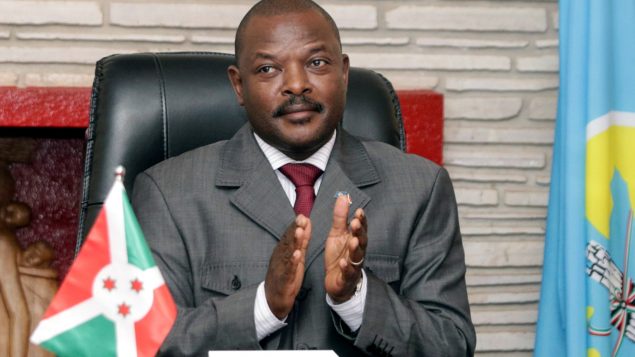
Burundi President Pierre Nkurunziza claps after signing the new constitution at the Presidential Palace in Gitega Province, Burundi June 7, 2018. (Evrard Ngendakumana/REUTERS)
The tiny East African country has faced a political, human rights, and humanitarian crisis since April 2015, when President Pierre Nkurunziza decided to run for a disputed third term.
In September, a United Nations Commission of Inquiry set up to investigate allegations of human rights abuses in the country said it had “reasonable grounds to believe that crimes against humanity have been committed in Burundi since April 2015.”
The commission blamed most violations on members of Burundi’s intelligence services, the police, the army, and the youth league of the ruling party, known as Imbonerakure.
And despite the Burundian government’s assertions that it has overcome the crisis, UN agencies and human rights groups report ongoing human rights abuses, including targeted assassinations, disappearances, abductions, acts of torture, rapes, and arbitrary arrests, forcing more people to flee Burundi.
The United Nations refugee agency, UNHCR, estimates that there are over 388,000 Burundian refugees in neighbouring Tanzania, Rwanda, Uganda and the DRC with more crossing every day.
Barankitse, a prominent humanitarian worker, the founder of Maison Shalom charity and a critic of Nkurunziza, was herself forced to flee Burundi to neighbouring Rwanda in 2015 and the Burundian government has shut down her operations in the country and frozen all of her accounts.
‘A mother’s cry’
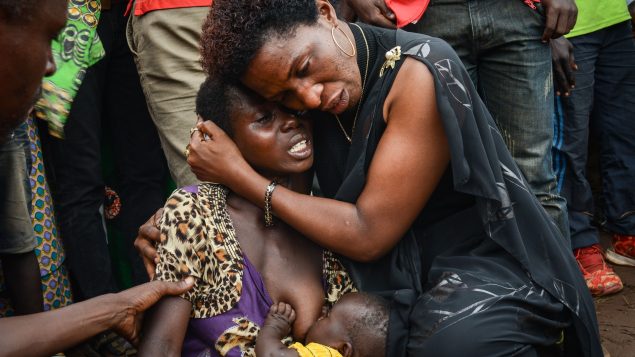
Family members of victims killed by an armed group react during their mass burial on May 15, 2018 at Ruhagarika village, northwestern Burundi, at the border with the Democratic Republic of Congo (DRC), where 24 people were killed. (STR/AFP/Getty Images)
Barankitse was invited to Canada by the Montreal chapter of Assemblée des Burundais du Canada (ABC Montreal), a Canadian-Burundian community organization that supports her work with refugees.
On Oct. 4, Barankitse testified in front of the House of Commons Subcommittee on International Human Rights in Ottawa.
“I am here to convey a mother’s cry,” Barankitse told committee members.
Burundi has become a glorified prison, she said.
“The silence of death hangs over Burundi,” Barankitse said. “Many mothers can no longer bury their children. Many mothers are raped. I work with them every day.”
On the verge of genocide
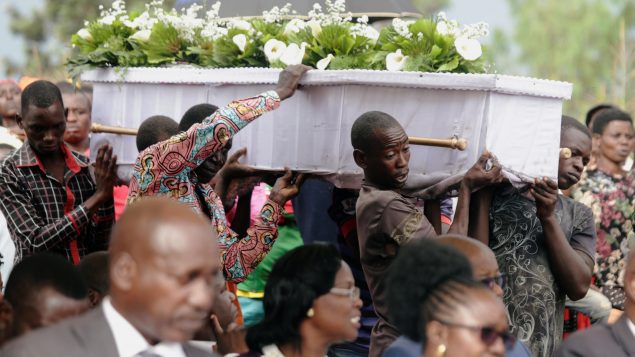
Residents carry the coffin of their relative killed in an attack, during the burial in Ruhagarika village in Cibitoke, Burundi May 15, 2018. (Evrard Ngendakumana/REUTERS)
Emery-Patrick Ndabwunze, a spokesperson for ABC Montreal, who testified along with Barankitse, said Burundi is on the verge of a genocidal civil war.
ABC Montreal worked with The Montreal Holocaust Museum on a an exhibit that looks at contemporary situations of mass violence using a scale that represents the 10 stages of a genocide, Ndabwunze told the committee. According to that frame of analysis, the situation in Burundi is at the eighth stage, he said.
At the same time, the Burundi refugee crisis is the most underfunded crisis situation in the world, Ndabwunze said in an interview with Radio Canada International.
“As we stand today, only 28 per cent of the $391 million US needed have been received,” Ndabwunze said.
“Fifty-two per cent of the Burundian refugees are and will remain in emergency shelters and 17,600 refugee students will continue to attend classes under trees, due to under-funding of the Burundian refugee situation, three years after the beginning of the crisis.”
‘Canada can do more’
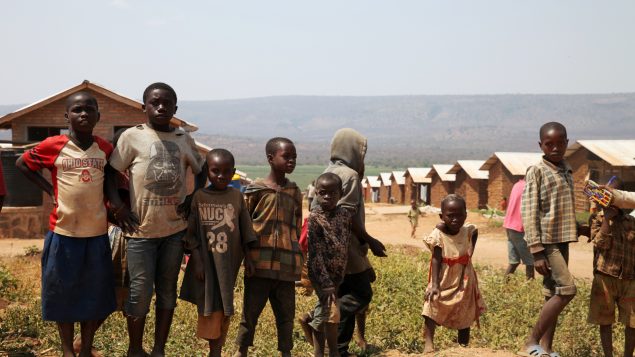
Burundian refugee are seen during a visit by Pakistani Nobel Peace Prize laureate Malala Yousafzai at the Mahama refugee camp, Rwanda, July 14, 2016. Picture taken July 14, 2016. (Katy Migiro/REUTERS)
Canada must engage more its partners on the world stage, particularly in the East African communities, by playing a positive role in a peaceful resolution of the Burundian crisis, Ndabwunze said.
Global Affairs Canada spokesperson Stefano Maron said Canada frequently expresses its concerns about the respect for human rights and freedoms in Burundi, particularly within the framework of the United Nations Human Rights Council and the Organisation internationale de la Francophonie.
“We firmly believe that the people of Burundi have everything to gain from an open and inclusive political dialogue between civil society and the opposition, while respecting fundamental rights and freedoms,” Maron said.
Since 2015, Canada has provided approximately $6.7 million to meet humanitarian needs in Burundi, Maron said.
Canada can and should do more, Barankitse said.
“We could then prevent things before it is too late, as was the case in Rwanda where your fellow Canadian, General (Romeo) Dallaire, tried to draw attention to the crisis, but was told that he was exaggerating,” Barankitse said.
A humanitarian icon
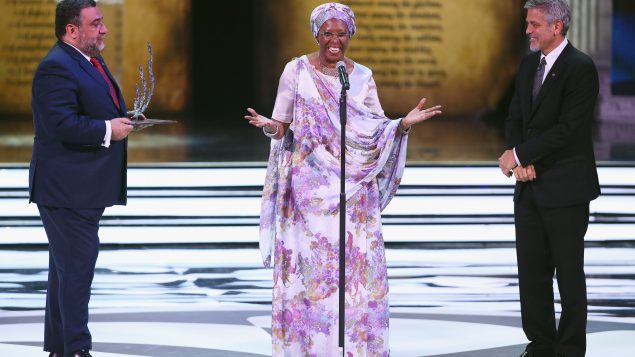
Aurora Prize Co-Founder Ruben Vardanyan, Aurora Prize finalist and Founder Maison Shalom, Marguerite Barankitse and Aurora Prize Selection Committee Co-Chair George Clooney on April 24, 2016 in Yerevan, Armenia. (Andreas Rentz/Getty Images for 100 Lives)
Barankitse was thrust into humanitarian work 25 years ago when she tried to stop an angry mob of fellow Tutsis from killing dozens of Hutus hiding in a diocesan building she worked in.
To punish her for what they considered a betrayal on the part of a Tutsi “sister”, the mob stripped her and tied her to a chair. Then they forced her to watch as they first set fire to the diocese building to force those hiding there to come out. Then the mob mercilessly hacked 72 people to death with machetes.
Following the massacre, Barankitse was left caring for 25 orphaned children.
“At first I thought this was just a one-off massacre and that I’ll be able to find these children’s relatives to return them to their care,” Barankitse said.
But with the civil war raging all around them and more and more orphans, Tutsis and Hutus, knocking on her door every day, Barankitse ended up with 400 children within seven months. Eventually, she established Maison Shalom, named so by one of the orphans after a song the children sang as they worked to clean up an abandoned school building that became their first home, she said.
Throughout the following years as her charity grew, Barankitse ended up caring for nearly 30,000 children until she was forced to flee to Rwanda with half of her staff in 2015.
In Rwanda, she has continued her humanitarian work, establishing two community centres, as well as advocating for more international funding for Burundian refugees, particularly in the field of education.
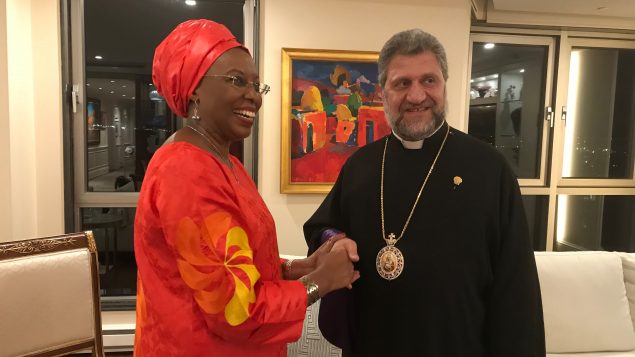
Marguerite Barankitse greets Archbishop Papken Tcharian, head of Armenian Prelacy of Canada, during a meeting in Montreal on Oct. 10, 2018. The meeting between Barankitse, Archbishop Tcharian and members of Montreal’s Burundian and Armenian communities was hosted by entrepreneur and philanthropist Levon Afeyan. (Levon Sevunts/RCI)
In 2016, she won the inaugural Aurora Prize, a prestigious humanitarian prize founded in memory of the Armenian genocide.
Winning the $1 million prize in Yerevan, Armenia, was an honour that she said was celebrated enthusiastically throughout the Burundian diaspora.
“You should have seen how they danced in the refugee camp – all the children were dancing all night!” Barankitse said.
The money she won also helped her to fulfil a promise she had made to send 300 of them to study in university, she said.
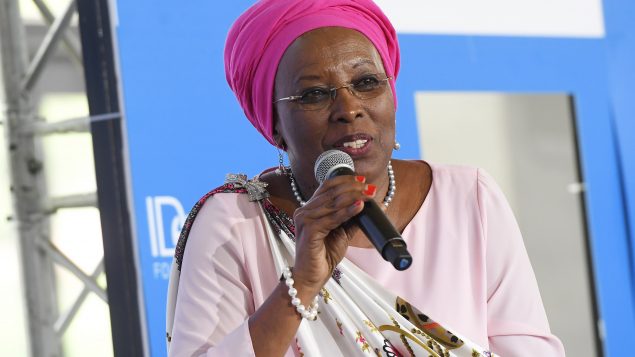






For reasons beyond our control, and for an undetermined period of time, our comment section is now closed. However, our social networks remain open to your contributions.